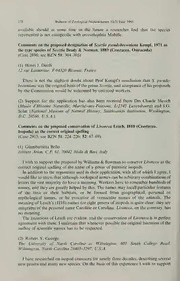Table Of Content178 Bulletin ofZoological Nomenclature 52(2)June 1995
available should at some time in the future a researcher find that the species
represented is not conspecific with aicetithophila Mabille.
Comments on the proposed designation ofScottiapseudohrowniana Kempf, 1971 as
the type species ofScottia Brady & Norman, 1889 (Crustacea, Ostracoda)
(Case 2896; see BZN 51: 304-305)
(1) Henri J. Oertii
12 rue Lamartine. F-64320 Bizanos, France
There is not the slightest doubt about Prof Kempfs conclusion that S. pseudo-
brownianawastheoriginalbasisofthegenusScottia,andacceptanceofhisproposals
by the Commission would be welcomed by ostracod workers.
(2) Support for the application has also been received from Drs Claude Meisch
(Musee d'Histoire Naturelle, Marche-anx-Poissons, L-2345 Luxembourg) and I.G.
Sohn (National Museum of Natural History. Smithsonian Institution. Washington.
DC. 20560, U.S.A.).
Comments on the proposed conservation ofLironeca Leach, 1818 (Crustacea,
Isopoda) as the correct original spelling
(Case 2915; see BZN 51: 224-226; 52: 67-69)
(1) Giambattista Bello
Lstituto Arion. C.P. 61. 70042 Mola di Bari. Italy
I wishtosupport theproposal byWilliams& BowmantoconserveLironecaasthe
correct original spelling ofthe name ofa genus ofparasitic isopods.
In addition to the arguments used in theirapplication, with all ofwhich I agree, I
would like to stressthat although zoological namescan bearbitrarycombinationsof
letters thevast majority do have a meaning. Workers have to remember hundredsof
names, and they are greatly helped by this. The names may recall particular features
of the taxa or their habitats, or be formed from geographical, personal or
mythological names, or be evocative of vernacular names of the animals. The
meaning ofLeach's (1818) names foreight genera ofisopods is quite clear: they are
anagrams ofthepersonal name Caroline orCarolina. Livoneca. on thecontrary, has
no meaning.
Theintentions ofLeach areevident, and the conservation ofLironecais in perfect
agreement with them. I maintain that wheneverpossiblethe original intention ofthe
author ofscientific names has to be respected.
(2) Robert Y. George
The University of North Carolina at Wilmiitglon. 601 South College Road,
Wilmington, North Carolina 28403-3297, U.S.A.
I have researched on isopod Crustacea for nearly three decades, describing several
new genera and many new species. On the basis ofthis experience I wish to support
i
Bulletin ofZoologicalNomenclature 52(2)June 1995 179
Dr Bowman's application toconserve the spelling Lironeca Leach, 1818. Leach used
anagrams ofCarolina to coin the names ofmany flabelliferan isopod genera, and it
isperfectlyclearthat Livonecawassimplyaprinter'serror. Let uscorrectthespelling
to Lironeca by acting positively in this case.
Comments on the proposal to remove the homonymy between brachypterinae
Erichson, |1845| (Insecta, Coleoptera) and brachypterinae Zwick, 1973 (Insecta,
Plecoptera), and proposed precedence ofkateretidae Ganglbauer, 1899 over
brachypterinae Erichson, 11845]
(Case 2865; see BZN 51: 309-311)
(1) P.A. Audisio
Dipartimento di Biologia Animale e deU'Uomo (Zoologia). Universita degli Studi di
Roma 'La Sapienza'. Viale dell'Universita 32, 1-00185 Rome. Italy
1. My application, co-authored with Dr R. Fochetti and ProfDr P. Zwick, seeks
to remove the homonymy between the insect family-group names brachypterjnae
Erichson, [1845] (Coleoptera) and brachypterinae Zwick, 1973 (Plecoptera). I
should like to clarify some points relating to the coleopteran name and to make a
further proposal to the Commission.
2. Erichson (1843) divided the family nitidulidae Latreille, 1807 into three
groups, the nitidulinae, the carpophilinae, and the 'Cateretes'. This last group,
which unlike the others was not referred to by a name with a family-group ending,
comprised the genera Brachypterus Kugelann, 1794 and Cercus Latreille, 1796, but
did not include Kateretes Herbst, 1793. Erichson commented that the group
contained onlytwogenerabut thattheirspecieshadhithertobeenplacedunderthree
names; he allocated some ofthe species placed in Kateretes by Herbst (1793) to the
othergenera. Under Articles 1lf(l) and 64 ofthe Code the name kateretidae is not
available from Erichson (1843), although it has been cited recently with this
authorship and date by Silfverberg (1992, p. 49) and by one of us (Audisio, 1993,
p. 781).
3. Erichson([1845])introducedthenamebrachypterinaeforthesamesubfamily,
i.e. the two genera Brachypterus and Cercus. He now considered that, although
Herbst's genus Kateretes included all sorts ofbeetles, it was based mainly on species
ofCis Latreille. 1796 and was in no way related to Brachypterus and Cercus(a view
not shared by later authors). He proposed that the name 'Cateretes' should be used
for the Cis group. The name brachypterinae Erichson, [1845] was used by several
authorsin themid-19thcentury forasubfamilywithin thenitidulidaebut. with few
exceptions (see Verhoeff, 1923, p. 9), has not been used since Marseul (1885, p. 19).
It has not been used at all for more than 50 years.
4. Thenamecateretiniwasfirst madeavailablebyGanglbauer(1899,p. 447) for
a tribe offive genera which included Kateretes Herbst, 1793 (with Cercuscited as a
synonym) and Brachypterus. Despite the seniority and previous usage ofthe name
brachypterinae, that ofkateretinae (sometimes spelled cateretinae) was univer-
sally adopted and, until very recently, used for a subfamily within the nitidulidae
which included, with other genera, Brachypterus and Kateretes. The kateretidae
have lately been considered to be a family separate from the nitidulidae (see

